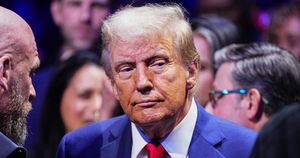On January 8, 2025, President-elect Donald Trump caused quite the stir by announcing his nominations for key health positions within his upcoming administration. Tapping three individuals with controversial backgrounds, Trump has ignited fierce debates about the future direction of public health policy across the nation.
Former Congressman Dave Weldon, M.D., was chosen to lead the Centers for Disease Control and Prevention (CDC), with the responsibility of shaping how America handles various health crises. If confirmed, Weldon would replace Dr. Mandy Cohen, who has been at the helm under President Biden. Following his tenure as a congressman from 1995 to 2009, Weldon has been vocally skeptical of the CDC and its vaccine programs. He has gone so far as to propose transferring the oversight of vaccine safety from the CDC to an independent agency within the Department of Health and Human Services (HHS). This raises serious eyebrows, especially since Weldon has championed the discredited notion linking vaccines to autism, particularly focusing on the preservative thimerosal used in vaccines.
Trump's pick goes hand-in-hand with Weldon's vocal alignment to Robert F. Kennedy Jr., another outspoken vaccine skeptic nominated to head the HHS. The tandem of Weldon and Kennedy could lead to significant pivots in how current vaccine recommendations are structured, potentially severely undermining the CDC's role as the go-to authority on vaccine guidelines.
The nominations don't stop there. Marty Makary, M.D., M.P.H., known for his opposition to COVID-19 mandates, is set to become the comissioner of the Food and Drug Administration (FDA). Currently affiliated with Johns Hopkins Medicine, Makary has garnered attention for his critiques of public health policies established during the pandemic. With his confirmation, he aims to address what he sees as the overwhelming influence of pharmaceutical and insurance companies over health regulations. He has publicly vowed to 'course-correct' the FDA, saying it has strayed from its intended purpose.
Adding to the mix is Janette Nesheiwat, M.D., who has been nominated for the role of Surgeon General. While Nesheiwat is known to be more favorable to vaccines compared to her counterparts, having previously advocated for COVID-19 vaccinations, her appointment could cause tension within the healthcare cabinet, which might lead to complications over public messaging around vaccines.
These nominees have sparked discussions about what Trump's overarching public health agenda could entail. Many experts are worried this crew does not prioritize conventional public health objectives. Instead, Trump’s selections may push for an anti-vaccine stance against the backdrop of rising health threats, including H5N1 bird flu and increased measles cases across the U.S. Currently, the CDC, under Biden's administration, has dealt with mixed public opinions on vaccines due to politicization — and experts fear this new direction could undermine efforts to combat misinformation spreading like wildfire.
The impact of these nominations could be substantial. According to Dorit Reiss, a faculty member at the University of California, Hastings College of the Law, “Anti-vaccine advocates see this as validation and as leverage for their agenda.” The feel across the public health community is one of apprehension, as many see this team as likely to disrupt decades of progress on vaccination coverage. Indeed, Weldon’s connections to conspiracy theories about vaccines and his push for reduced vaccine oversight might lead to reduced community confidence in vaccination.
The CDC is responsible for monitoring and responding to infectious disease outbreaks, as well as setting emergency response guidelines. If Weldon, Makary, and Nesheiwat move forward with Trump’s agenda, they could wield significant power over public health directives. Dubbed by some as ‘in the driver’s seat’ of health policy, they could shape recommendations and influence vaccinations schedules for years to come.
Public health experts also point out the importance of organizations like the Advisory Committee on Immunization Practices (ACIP), which guides CDC recommendations on vaccines. Typically, the CDC director tends to follow ACIP recommendations; still, it’s not uncommon for those recommendations not to be upheld, especially under political pressure. Should Weldon choose to diverge from these outside expert recommendations, vaccine standards and guidelines could become more politically charged rather than evidence-based.
Beyond just vaccines, Trump’s picks touch upon how other agencies handle food safety and health care practices. Makary’s perspective on pharmaceuticals and medical practices could influence patients’ access to necessary medications, especially if he becomes staunchly opposed to certain drugs or treatment protocols.
Concerns also extend to how insurance coverage operates under this new administration. If the ACIP were to be influenced to alter its vaccine recommendations, insurance companies — which are currently mandated to cover vaccines under the provisions of the Affordable Care Act — could shift their policies based on new recommendations, limiting access to necessary vaccinations for many.
Experts express alarm over pressing health issues, including the spike in whooping cough and measles, alongside the looming concerns about bird flu transmission among poultry."We’ve got H5N1 accelerating in birds, whooping cough, increases in measles outbreaks," said Peter Hotez, co-director of Texas Children’s Hospital Center for Vaccine Development, highlighting the urgent need for swift and knowledgeable leadership at health agencies.
While Trump’s public health strategy appears to gravitate toward skepticism of traditional models, it’s unclear how the new appointments would challenge existing health regulations. Would the director of the CDC feel emboldened to ignore the established practices set by decades of public health expertise? Would the Surgeon General, under new guidance, become less of medical authority and more of a political puppet? These are questions swirling amid the preliminary assessments of Trump’s selections.
All eyes will undoubtedly remain on these nominations as they proceed through the confirmation process, with many advocating for checks and balances on health policy moving forward. This new administration could either become the harbinger of progressive health reforms, or it may regress, clinging to debunked theories and dismantling advancements achieved over years.
These nominations are significant not only for the Trump administration’s agenda but for public health as we know it. Many hope current science-based frameworks will outlast the political storm brewing on the horizon, as the new administration might threaten the delicate balance existing between political motivations and public health safeguarding.



